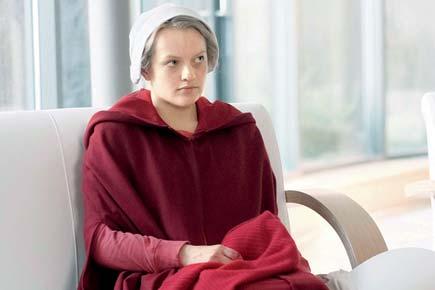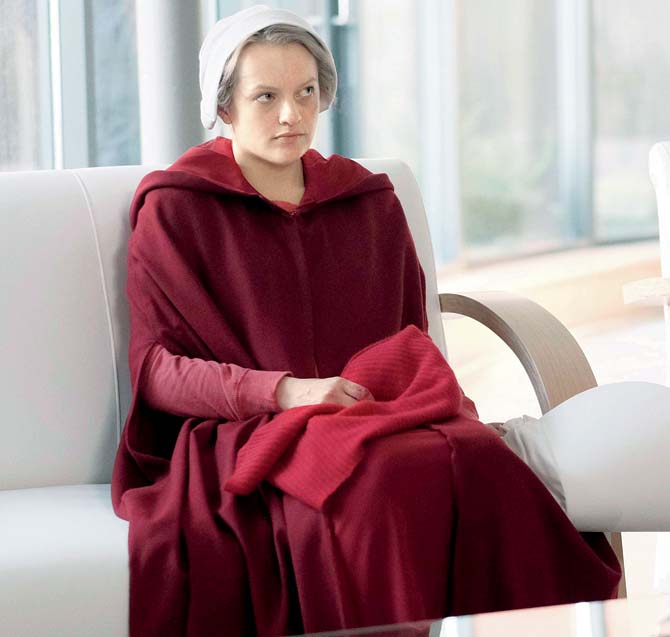Rather than fret about being slotted as a woman writer, it is exciting to think of women speaking to each across time through art or text


Elisabeth Moss plays Offred in the TV adaptation of The Handmaid's Tale
ADVERTISEMENT

I downloaded the e-book and began this exquisite treatise on the writer's full-blown love affair with the colour blue. Then I arrived on paragraph 166 and was startled by the coincidence - "The 1939 film, The Women was shot entirely in black and white, with the exception of one Technicolor sequence - a fashion show - which was literally detachable from the rest of the film. This coloured reel had no bearing on the plot whatsoever, so the projectionist could choose to insert it as part of the movie or ignore it altogether. Could one imagine a book that functioned similarly, albeit in reverse - a kind of optional, black-and-white appendage to a larger body of blue (e.g., 'the blue planet')?" I'd had a similar such moment of encounter with the eerily familiar at passage 146 and 147, when Nelson refers to Marguerite Duras, one of my favourite writers, whose interviews with Leopoldina Pallotta della Torre, compiled in the form of Suspended Passions, I had been reading the week before. Nelson then does another number on me by ending her book with an invocation from Simone Weil's Gravity and Grace just after passage 238, when she tells her beloved, the one who left her for someone else, that there was a time when she would have rather had him by her side than any one of these words, than all the blue in the world -"But now you are talking as if love were a consolation. Simone Weil warned otherwise. 'Love is not consolation,' she wrote. 'It is light.'"
Upon returning to Delhi and resettling myself in the sanctity of my solitude, I got back to Bruce Miller's television adaptation of Margaret Atwood's The Handmaid's Tale, continuing with the episode when Offred discovers during her solitary confinement that her predecessor, who had hanged herself, had left her a note in the cupboard. In Gilead, the newly constituted name of the United States after it was taken over by a bunch of totalitarian religious fundamentalist men, women are not allowed to read, write, or listen to music. The penalty for writing is having one's hand amputated. Offred's predecessor had found some implement which she used to scratch onto the wood of the wardrobe, "Nolite te bastardes carborundorum." It is a Latin phrase and grammar school joke, "Don't let the b*****ds grind you down." Offred figures out its meaning. I had forgotten about this ingenious insertion by Atwood into the framework of the book and was happy to be reminded. The next couple of nights, Offred finds great solace lying down in this wardrobe, from which hang the same red outfits she is compelled to wear day after day as a handmaid, and re-reading this phrase. It's the kind of message that slowly seeps into your soul, administering fragmented doses of courage.
I love the idea of women speaking to each other across time, of women writers and artists leaving these notes, or palimpsests within their art or their texts for later decoding. And although I struggle so much with being slotted as a woman writer, and, as an arts journalist, having to slot others as woman artists, I have begun to now wear it as a badge of honour, a gateway that grants me access to this immense collective of female practitioners across millennia who defined their being through their art, no matter the consequences, no matter the stigma or the alienation it involved.
I make my case with this ferocious call to womanly action written by Virginia Woolf in her 1929 essay, A Room of One's Own - "Therefore I would ask you to write all kinds of books, hesitating at no subject however trivial or however vast. By hook or by crook, I hope that you will possess yourselves of money enough to travel and to idle, to contemplate the future or the past of the world, to dream over books and loiter at street corners and let the line of thought dip deep into the stream."
Deliberating on the life and times of Everywoman, Rosalyn D'Mello is a reputable art critic and the author of A Handbook For My Lover. She tweets @RosaParx. Send your feedback to mailbag@mid-day.com
 Subscribe today by clicking the link and stay updated with the latest news!" Click here!
Subscribe today by clicking the link and stay updated with the latest news!" Click here!






